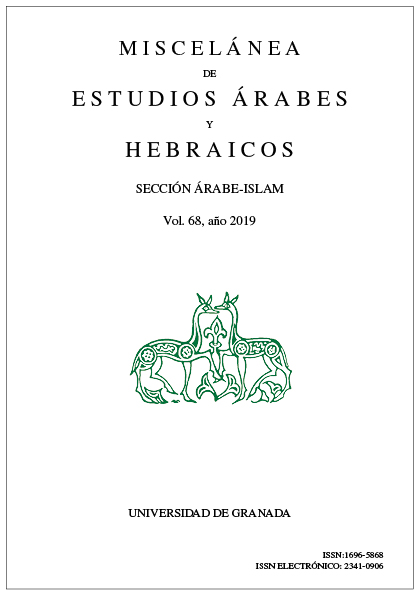ʻAbbās Maḥmūd al-ʻAqqād (1889-1964): self-portrait of his childhood and youth
DOI:
https://doi.org/10.30827/meaharabe.v68i0.980Keywords:
Modern Arabic literature, Autobiography, EgyptAbstract
This paper analyzes the childhood and adolescence (1892-1907) of the renowned Egyptian polymath and great renovator of contemporary Arab poetry ‘Abbās Maḥmūd al-‘Aqqād. The documentary sources used include the first volume of his posthumous autobiography, Anā (1964), the biographies about him published by the literary critics ‘Abd al-Fatāḥ al-Dīdī, Jābir Qumayḥa, Shawqī Ḍayf and Ḥamdī al-Sakkūt, the memoirs of his close friend Muḥammad Ṭāhir al-Jabalāwī and those of Fāṭima al-Yūsuf and, finally, the information provided by Ṭāhir al-Ṭanāḥī, the editor of al-‘Aqqād´s autobiography. This study seeks to delimit the possible causes of his intransigent character by applying the study method that al-‘Aqqād used in the composition of the biographies he wrote about history's great figures. This method, called Falsafa al-sujṭ (philosophy of discontent,) consists of attempting to demonstrate that every man who shows exceptional abilities and great talent is in fact compensating for a physical weakness. The paper concludes that in the case of al-‘Aqqād the premise of the compensation of physical weakness with the endowment of exceptional abilities and talent can be confirmed.
Downloads
Downloads
Published
How to Cite
Issue
Section
License
The authors publishing their work in this journal agree to the following terms and conditions:
1. The authors retain the copyright and give the journal the right to be the first publication of the work and also to be licensee under a Creative Commons Attribution License which allows others to share the work, provided the author of the work and the initial publication in this journal are acknowledged.
2. Authors may make additional agreements separately for the non-exclusive distribution of the version of the work published in the journal (for example, putting it in an institutional repository or publishing it in a book), with acknowledgement of its initial publication in this journal.
3. Authors are allowed and encouraged to electronically disseminate (for example, in institutional repositories or on their own web page) the published version of their works (publisher's post-print version) or, if not possible, the author's reviewed and accepted post-print version. This is to facilitate productive exchanges, and allow for earlier and greater citation by third parties of the published works (See The Effect of Open Access).
4. The journal accepts no responsibility for the opinions expressed by the authors.















